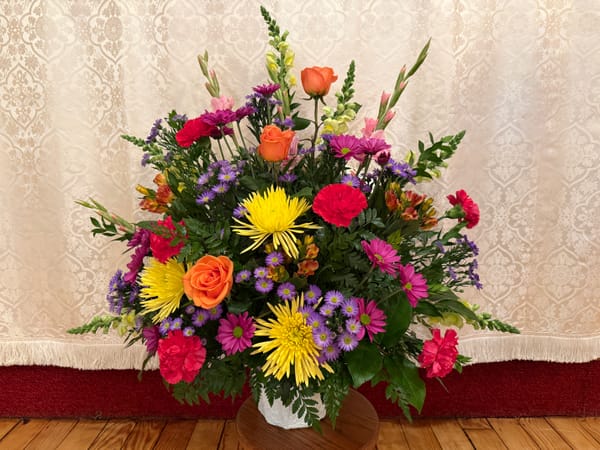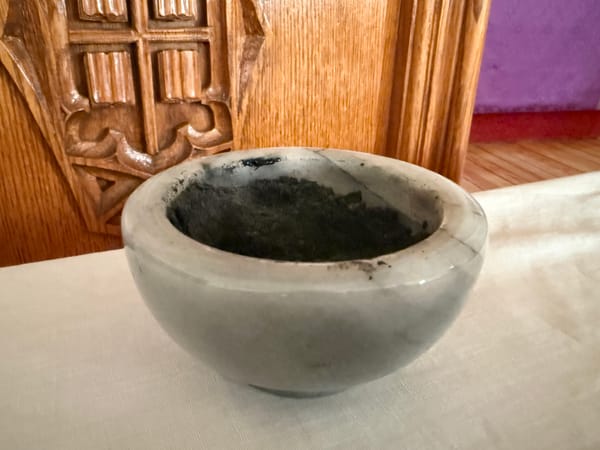Prayer: Not Just for the Monks
Prayer allows us to sit with the God of love, transforming our frustrations into opportunities to show love, mercy, and grace. It changes everything.

July 27, 2025 - The Seventh Sunday after Pentecost
My friends, I speak to you today in the name of one God, Father, Son, and Holy Spirit. Amen. Please be seated.
Good morning, Epiphany. It is good to be back with you again this morning. When the readings began today, when we read the Old Testament passage from the lectionary, I’m guessing some of you were worried or expecting that I’d be preaching on the well-known and very-much-abused judgment of Sodom and Gomorrah. Welcome to church, right? This part of the story is the passage where Abraham begs for mercy for the righteous, and God was willing to offer it; it’s one of the nice-ish parts. We won’t be talking about that whole deal this time around. No fire from heaven, no pillars of salt... you’re welcome.
Instead, we’re going to again focus on the Gospel text, on Luke 11, on what is likely an incredibly familiar set of verses for us, or at least a set that sounds familiar. This may not be exactly the words you’re used to, thanks in part to centuries of translations, but this is the scripture from which we learn “the Lord’s Prayer,” a standard in Christian worship since the first century. A few more words are found in the Gospel of Matthew, where Jesus teaches this prayer in his Sermon on the Mount, and then the final bit, “for the kingdom, the power, and the glory are yours, now and forever, Amen,” that can be found in the earliest of Christian worship manuals, the Didache, those words added to the scripture’s prayer to round it out, to complete it. This prayer, then, feels as key, as fundamental to Christianity as it gets, so yes, we’re going to talk about it this morning.
Prayer has been on my mind all week long, maybe especially since Pastor Bob preached last week on the presence of Mary at the feet of Jesus, on our attentive presence with God and with each other. You may have heard that a group of us planned to spend our week in Midland, Michigan, at a conference of sorts, at an intensive training seminar that would help us understand organizational development theory... you may have also heard that we left that conference a bit early. I discussed it briefly in the e-notes this week. Having left Midland on Monday, I had a relatively open week on my schedule, and so I fit in my first silent retreat as your rector, something I’m required to do by the diocese and by your vestry, and I visited St. Gregory’s Abbey in Three Rivers, Michigan, on Wednesday.
St. Gregory’s is a Benedictine Monastery in the Episcopal Church, located in what feels like the middle of nowhere, which is probably a great place for a monastery. Most of you likely associate monasteries and monks, convents and nuns, with a different branch of the Christian tradition, one a little more Roman. But Episcopalians have them too, we have people devoted to lives of prayer, of service, of discipline and structure. I met my first Episcopal nuns in seminary, at the Community of St. Mary in Sewanee, Tennessee. Similar to the monks at St. Gregory’s, the nuns of St. Mary’s pursue “care for the body, the soul, and the earth,” through “prayer, solitude, ministry to the poor, spiritual direction, and hospitality.” These nuns were some of the most grounded, the most peaceful of my seminary classmates; the monks I briefly met on Wednesday were similarly grounded, quiet, peaceful. Visiting St. Gregory’s was like stepping out of the world for a few hours, out of the concerns and the anxieties that bombard us on a minute-by-minute basis in our regular lives, concerns that are overwhelming if we’re not careful.
Now, that might sound nice to some of you, escaping to a rural church on a vast wooded property... having time for prayer, contemplation, reading, silence. I really needed it; I really appreciated my time spent in Three Rivers. But I also realize that experience, that disconnected life, it might sound like hell to some of you. Some of us need outside stimulation, we need conversation partners, we need entertainment, we need the news. And that’s not a bad thing either; not all of us are called to be monks and nuns! ...The life of the monastery, the convent, it might sound privileged to some of you too. Surely, we need to be engaged in the world; surely, we need to be fighting for justice in the public square; surely, we need to be productive for the sake of our families and our society.
Don’t worry, then: I will not be advocating from this pulpit this morning that we all drop everything and take vows of holy orders, that we leave our lives behind and take on new names and wear habits and tunics. Instead, what I will be advocating for this morning, what I’m asking all of us to consider, is that prayer is a fundamental, essential part of the Christian life, and we, like the monks and the nuns, should be sure to take adequate time to explore it. Prayer is an essential part of any spiritual life, of any walk with God. Prayer requires us to recognize that something greater is happening than what we see in front of us. Prayer gives us a chance to slow down for just a minute and realize that the activities of our lives will not earn us God’s love; God’s love is available to us just as we are. Prayer provides space for us to calm ourselves, to let go of our anxieties by laying them at God’s figurative feet. Prayer allows us to sit with the God of love, transforming our frustrations into opportunities to show love and mercy and grace. Prayer opens us to the gift, the presence of the Holy Spirit. Prayer changes us. It changes everything.
Now, I have not always been the biggest fan or practitioner of prayer, myself. I realize, more and more each day, that I am a child of my environment, of the internet and the information age. I long for the dopamine that comes with every scroll on my device, every funny video, every text message heart and laugh, each video game accomplishment achieved. My mind is constantly active, thinking about sports scores or what book I’m reading, planning the next vacation or kids’ birthday. It helps personally that I’ve added sermon writing, community activism, and church work into that mix; it’s not all selfish or silly, my mind does now race around things that do matter... I’m guessing that some of you can relate to some of this, the constant drumbeat of attention-seeking devices and news stories and activities and concerns. You might also relate to my personal inability to slow life down, to find an hour to just sit and admire the lake, to take 30 minutes to sit in our chancel and be still to find ten minutes, three minutes, a single minute in silence. Even if you are retired, I know many of you struggle with this, with being still... you have a television at the ready, or a tablet, or a podcast or an audiobook to fill even your few moments of quiet, because the quiet conveys to you that you’re wasting time, that you’re being unproductive, that you’re not doing enough. The quiet can open you up to hurts that you’d rather not experience again, to pain, to thoughts you’d rather not be having.
But Mother Teresa of Calcutta once said, “The fruit of silence is prayer, the fruit of prayer is faith, the fruit of faith is love, the fruit of love is service, and the fruit of service is peace.” Epiphany, this morning, I’m asking us to consider that our pain, our anxieties, our broken relationships, the problems in our world, they can all be alleviated through prayer, through stillness, through attentive presence with our God. You see, action that comes from a foundation of anxiety and fear will always be less effective, less loving, less world-changing than action that comes from a foundation of silence, faith, love, service, and prayer. Rowan Williams explained it this way in his book, The Way of St. Benedict, “what you receive is what you give, what you put into circulation. If you put in grievance, you will get back grievance.” If we ourselves are not at peace, if we have not taken the time to be at peace, how can we expect anything else in our lives in return?
If you’ve followed along with me this morning, or if you’re just now checking back in, I’m hoping that you’re now thinking, as I have at many times in my life, “Sounds good, preacher, so how exactly do I pray?” And if you are asking that question this morning, you find yourself in good company. We are alongside the disciples at Jesus’s side asking him to teach them how to pray. His answer is a familiar one: the Lord’s Prayer. We will pray it together as part of our communion service here in a few minutes. In these few sentences, Jesus gives the disciples a good foundation: blessing God, asking for God’s kingdom to come to earth, asking for daily sustenance and forgiveness for where we have gone wrong, asking to keep us out of trouble in the future. You cannot go wrong with praying this, over and over, or praying these words and then sitting in silence. Keeping the Lord’s Prayer as the background soundtrack for your life would be a beautiful start.
Our Centering Prayer group on Tuesday and Thursday mornings practices prayer too; our Wednesday services at noon and at 7 pm, they practice prayer. This is a house of prayer and an accomplished one: ask the people here in community around you how they pray, how they make time for silence and peace in this busy and anxiety-producing world, and then learn from each other. I have learned so much in my time at Epiphany about prayer; I will continue to learn from and be shaped by all of you in the many years to come.
The Episcopal Bishop of Texas, Andy Doyle, released a book this summer that has also shaped me over the last month, and one quote connects especially well for us this morning. It’s a long quote, but it’s worth reading the entirety of it here before I finish. Bishop Andy writes, “There is so much pain and suffering in the world – something many great wisdom teachers have seen and experienced over centuries. So many then have said to their followers, as Jesus said to those who followed him, come away with me and let us pray. Prayer brings peace and peaceful action. The longer it is practiced, the deeper one goes, the more one may discover a peace beyond understanding such that we are not blown around by the winds of change, war, and political instability. We need people who are peace bringers, peace givers, and peacemakers, for they are blessings to us in our times of need. And in peace, we are known as children of God.”
Friends, I ask that this morning you all consider prayer, maybe for the first time, maybe for the hundredth time. Pray so that you may find peace, pray so that you may explore your own faith, pray so that you may be a better parent, sibling, child, friend, and neighbor. Through prayer, we are asking God for the gift of the Holy Spirit, for God’s love to wash over us and form us. And as Jesus said in our gospel this morning, if we who are only human know how to give good gifts to our children, how much more will the Almighty God give all of us the gifts that we need, peace and joy and love and God’s presence, when we take the time to ask for them?
Amen.




